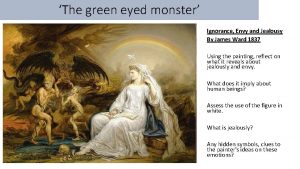Shakespeares Othello THEMES THEME OF JEALOUSY AND ENVY


















- Slides: 18

Shakespeare’s Othello THEMES

THEME OF JEALOUSY AND ENVY Othello is the most famous literary work that focuses on the dangers of jealousy. The play is a study of how jealousy can be fueled by mere circumstantial evidence and can destroy lives. In Othello, the hero succumbs to jealousy when Iago convinces him that Desdemona has been an unfaithful wife – in the end, Othello murders his wife and then kills himself. It is interesting that Iago uses jealousy against Othello, yet jealousy is likely the source of Iago's hatred in the first place. In Othello, jealousy takes many forms, from sexual suspicion to professional competition, but it is, in all cases, destructive.

THEME OF JEALOUSY AND ENVY There are many examples of jealousy and envy throughout the play ‘Othello’. Envy is wanting what someone else has and jealousy is the feeling of fear that something you have will be taken by someone else. Iago envies Cassio because Cassio has been appointed lieutenant, the job Iago wanted. Iago also envies Othello because the Moor has achieved the kind of success and glory that Iago longs for. Roderigo envies Othello because he has won Desdemona’s hand in marriage. It seems Iago might also be jealous of Othello suspecting that the Moor has slept with his wife. Bianca also suffers from jealousy. When she finds Desdemona’s handkerchief in Cassio’s room, she becomes enraged and is convinced Cassio has a new girlfriend. However, Cassio soothes her and she does not let her jealousy overcome her.

THEME OF JEALOUSY AND ENVY OTHELLO’S JEALOUSY Is Othello jealous by nature? Before Iago makes him suspicious, he is happy to see her in the company of Cassio. He believes that just because his wife is outgoing and friendly does not mean she is having affairs. When Iago does begin to suggest Desdemona is being unfaithful, Othello says he will not doubt her until he has seen proof of her infidelity: ”Nor from mine own weak merits will I draw/ The smallest fear or doubt of her revolt” Desdemona also believes her husband is not a jealous man: “I think the sun where he was born/ Drew all such humours from him. ” However, once Iago starts planting the seeds of doubt in Othello’s mind, we clearly see evidence of jealousy.

THEME OF JEALOUSY AND ENVY OTHELLO’S JEALOUSY Iago is very clever in the way he goes about making Othello jealous. He warns the Moor to be careful of jealousy but the warning is designed to make Othello think jealous thoughts. “Beware, my lord, of jealousy”. He plants the word in Othello’s mind, knowing it will take root and grow. Iago gives an excellent description of what jealousy entails: “It is the green-eyed monster which doth mock/ The meat if feeds on …” What causes Othello to suffer most is suspecting but not knowing. He claims to be free from jealousy and insists he will only doubt when he receives proof but Iago knows the Moor will doubt and suspect before that point. While Othello firmly believes he is not the jealous type, he also believes Iago is honest friend so his judgment can’t always be trusted.

THEME OF JEALOUSY AND ENVY OTHELLO’S JEALOUSY Iago tells Othello just enough to get him thinking in a jealous manner. He tells him to watch Desdemona closely, not with a suspicious eye but not with a trusting one either. This is a clever piece of reverse psychology – telling someone not to be jealous while also giving them cause to be jealous. Iago later gives Othello greater cause to be jealous when he brings the handkerchief into play. While it might seem a rather innocent item and its misplacement hardly a cause for concern, Iago knows the jealous mind is capable of making something significant out of nothing much: “Trifles light as air/ Are to the jealous confirmations strong”.

THEME OF JEALOUSY AND ENVY OTHELLO’S JEALOUSY It is not long before Othello is overwhelmed by his jealousy. He tells Iago that his life has become hellish and there is no respite from his jealous thoughts. “Thou hast set me on the rack”. Iago does not allow the Moor a moment’s peace, continuing to insinuate what Desdemona and Cassio might be doing in bed. Eventually Othello is so overcome he collapses. Tragically, Othello never learns how to cope with or overcome his jealousy. He convinces himself that killing his wife is the righteous thing to do. “She turned to folly and she was a whore”. When he discovers, too late, that she was innocent, he does not hesitate to kill himself.

THEME OF RACE Othello is one of the first black heroes in English literature. A military general, he has risen to a position of power and influence. At the same time, however, his status as a black-skinned foreigner in Venice marks him as an outside and exposes him to some pretty overt racism, especially by his wife's father, who believes his daughter's interracial marriage can only be the result of Othello's trickery.

THEME OF RACE Questions About Race: 1. Which characters in the play make an issue of Othello's race? 2. What kinds of stereotypes are at work in this play? 3. How does Othello's race affect his relationships to his wife and to other characters? 4. How does Othello's race play a role in the hero's self-identity?

THEME OF RACE Othello: A Stranger from a Savage Land Othello’s racial background is obviously different to that of the Venetians he lives among. Yet his skin colour is not the only difference. Othello’s homeland, in contrast to sophisticated Venice, is described as bleak and desolate. The violent lands Othello describes are peopled by cannibals and other monsters also contrast to civilised Venice. To many Venetians then, Othello must seem like a savage stranger from a savage land. We can imagine some viewing him as a primitive creature who can not be trusted. The great elegance with which Othello speaks disproves this image of him. He is a skilled public speaker and perhaps he means to shows the Venetians that he matches them for elegance.

THEME OF RACE Bigotry and Racism There is a strong undercurrent of racism in the play ‘Othello’. Othello, as a black man and a foreigner encounters vile bigotry and racist attitudes. This is clear at the start of the play when Iago suggests Othello’s Moorish background makes him not only a “devil” but also a kind of animal. Iago describes him as a “black ram” and as a horse and implies he is sexually corrupting Desdemona to her father. Iago plays on the racist fear of intermingling of different races. According to Iago if Othello and Desdemona were to have children they would be subhuman creatures.

THEME OF RACE Bigotry and Racism Iago suggests to Othello that Desdemona will “repent” marrying him and will leave him for someone more like herself. Iago is attempting to manipulate Othello, of course, but the fact that he succeeds so easily indicates just how pervasive such attitudes were in Venice at the time. Brabantio echoes this attitudes. He claims that the relationship between Desdemona and Othello is not a natural one. Desdemona, he says, has gone against “all rules of nature” by falling in love with a black man. Brabantio’s bigotry is evident when he describes Othello stealing Desdemona away to his “sooty bosom”. He plays to a racial stereotype when he associates Othello with voodoo. Even the Duke’s suggestion that Othello’s virtues make him “fair” rather than black, almost as if he were white on the inside, is a reminder of the casual racism that pervades Venetian society.

THEME OF RACE Is Othello a Racist Play? Othello confronts the sterotypical view that black people are not only gullible and easily manipulated but also impulsive and prone to violence. Iago says “these Moors are changeable in their wills” Initially the play seems to rebut these stereotypes. Though Othello comes from a foreign land he occupies a powerful and influential place in Venice. He is a respected general who has won many battles and is chosen to lead the allimportant defence of Cyprus. His keen intelligence is clear in the sophisticated speeches he gives to the council. He is calm, composed and confident when addressing Brabantio’s accusations. On top of all this he has managed to marry the most desired beauty of the city.

THEME OF RACE Is Othello a Racist Play? Yet as the play goes is the stereotype seems confirmed? Does Othello show himself to be gullible and violent or is he helpless against Iago’s schemes and manipulations? Some argue the play is a racist one, reinforcing negative racial stereotypes. Others disagree, viewing the world of the play as racist rather than the play itself. They would argue the play is a largely positive depiction of an interracial marriage and a good man who is brought down by Iago and his own insecurities. Is Shakespeare then trying to highlight the racism of society and shows the tragedy of a man who is brought down because he is insecure about his racial status.

THEME OF HATRED Hatred is supposed to have a cause, some concrete event or insult that inspires a lasting rage. But in Othello, the play's villain is motivated by a hatred that does not have any reasonable cause. Iago's hatred and his determination to destroy his boss, Othello, seems out of proportion with the reasons he gives for it: anger that Othello did not promote him or jealousy that Othello might have slept with Iago's wife. Iago's loathing has been famously called a "motiveless malignancy" that redefines our understanding of hatred, making it seem a self-existing passion rather than the consequence of any particular action.

THEME OF HATRED While the play ends with a great number of the characters angry with each other, very few of those characters truly hate. Brabantio, to a degree, demonstrates a hateful nature in his treatment of his own daughter. When he learns of her marriage he claims Desdemona has turned him off children. “I am glad at soul I have no other child”. Not only does Brabatio turn against her but he tries to turn Othello against her also – an act of incredible spite. “She has deceived her father, and may thee”. However, the only one who holds a pure, unprovoked hate in his heart is Iago. He happily feeds off his hate. Iago is the only character who welcomes hatred into his mind and deliberately infects others with it. He enjoys the chaos he is capable of instilling in others.

THEME OF HATRED He hates Cassio for being promoted ahead of him and he hates Othello for giving it to him. The retribution he plans is completely disproportionate to the grievance he suffers. He is determined to destroy the lives of those who have crossed him. The play begins with Roderigo remarking on the deep disdain that Iago has for Cassio. His narrow-minded opinion of women reveals his misogynistic outlook, which is also clear in the way he speaks to Desdemona and Emilia throughout the play. Every single thing Iago does is done out of malice. He does not speak one word of kindness or compassion. Every act or gesture is done only to further his evil plans.

THEME OF HATRED While Othello turns very quickly to hate in the latter part of the play, it is a baseless hate, one born purely from the jealousy Iago stirs in him. He struggles with is visibly throughout the play and once he realises the truth is deeply remorseful. He is overcome with guilt and takes his own life. Iago is in complete contrast. When all of his scheming has been revealed, he is unrepentant, still arrogant even. He stabs his wife to death and refuses to explain his actions. He offers no apology to either Othello or Cassio. His schemes have failed. Three bystanders (Desdemona, Roderigo and Emilia) have died because of his plots and he faces torture and death for his crimes. And still he is completely indifferent. This is true hatred.
 Jealousy theme statement examples
Jealousy theme statement examples Shakespeare tragedy about racism and jealousy
Shakespeare tragedy about racism and jealousy Envy and hatred
Envy and hatred Jealousy in othello
Jealousy in othello Dave paris romeo and juliet
Dave paris romeo and juliet Othello falling action
Othello falling action Othello planting the seeds of doubt summary
Othello planting the seeds of doubt summary Shakespeare career
Shakespeare career Theme of hamlet
Theme of hamlet Idioms shakespeare
Idioms shakespeare Comic relief in macbeth act 1
Comic relief in macbeth act 1 Theme of othello
Theme of othello Othello act one scene one
Othello act one scene one Theme in othello
Theme in othello Themes of othello
Themes of othello Regression psychology
Regression psychology Envy proverbs
Envy proverbs Sissy castration
Sissy castration Lesson 19 noble gas envy ions answers
Lesson 19 noble gas envy ions answers

































